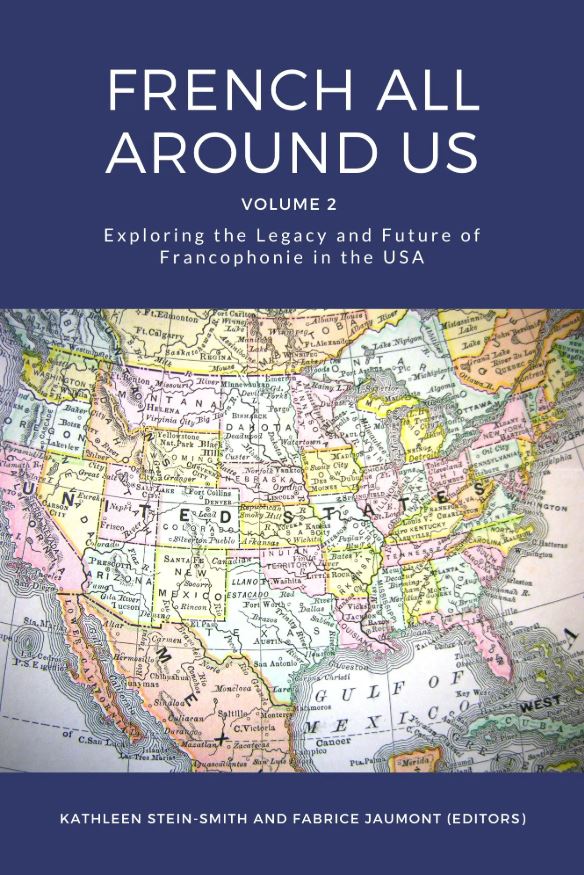Many important works of Franco-American history—local studies, surveys, biographies, etc.—have appeared in the last decade. Researchers who are engaged in scholarship have their own, slightly forbidding arena in the form of academic journals. Typically, broader perspectives on the United States’ French universe from non-historians have been accessible online or in occasional in-person events, with few published works providing a platform for non-academics. This has lately changed, and changed for the better, with two book projects stewarded by editors Kathleen Stein-Smith and Fabrice Jaumont.
The two volumes of French All Around Us (available here and here) boast a diverse array of perspectives from teachers, filmmakers and podcasters, creators of all kinds, other contributors with deep interest in the subject, and, sure, maybe a few historians. These contributing authors provide glimpses of the Northeast, the Midwest, and Louisiana. Significantly, while some chapters discuss the Acadian and French-Canadian migrations and their legacies, others offer West African, Haitian, and Indigenous perspectives. The two volumes thereby foster valuable connections between individuals and communities that may not have the time or means to seek out the experiences of groups facing similar situations.
All chapters are worthy of our attention, but several in particular will highlight the depth and breadth of the latest volume.
In “The Francophonie is Here: French Language and Francophone Identity in the Rust Belt,” Claire-Marie Brisson expands our field of vision beyond Louisiana and a cluster of northeastern states. Taking her journey as a Franco-Michigander and the expression of an authentic self as a starting point, Brisson sees great potential in the historically diverse Midwest. Though the Francophonie has at times proven divisive by virtue of litmus tests, it also promises to serve as connective tissue in multilingual and multicultural settings. The message is clear: the Midwest is fertile ground for governments, institutions, and businesses willing to invest in culture.

Maya Smith, author of “From Dakar to the Diaspora: Senegalese Voices Shaping Francophone America,” highlights the French language’s place in the multilingual setting of immigrant communities. Newcomers from Senegal have wrestled with challenges facing other francophone minority communities, including the ever-present question of “proper French.” At the same time, they have contended with racism, limited visibility, and the legacies of colonialism, including the interplay of French and Wolof. Better acknowledgment of the Senegalese and other African diasporas enriches our understanding of the American Francophonie.
For their part, Steven J. Sacco and Megan Diercks explore “The Role of External Funding in Building and Preserving College and University French Programs in the United States”—a timely piece. That French has been embattled in both K-12 and college education in the U.S. would be an understatement. Sacco and Diercks propose an analytical matrix to address the existing state of French programs. They also offer advice on seeking funding opportunities that bypass the internal obstacles of educational institutions (be it lack of internal funding or administrative barriers). This short but effective chapter invites readers to focus on opportunity rather than the things that cannot be resolved.
This volume also includes a chapter from your friendly neighborhood historian. I take a look at celebrations held in Worcester, Massachusetts, in 1949. These events honored an invented “Franco-American centennial”—invented, for organized French-Canadian life in the United States had not begun in 1849. A congress held at the time was deemed the first Franco-American convention since 1901. Yet, we hear little of these events today because (I contend) they did not announce a new chapter in the history of the community; rather, planners and leaders offered a stale consecration of cultural dogmas that had prevailed for several generations. By no means was this a creative, grassroots response to the new challenges facing Franco-Americans in the postwar period. This should inform our approach to the major anniversaries that await in 2026 (more on those in the chapter).
Ultimately, I make three overarching claims. First, Franco-American history stretches much farther back than we might suspect and we have to understand Franco experiences in the context of that longue durée. Second, once we start looking at the full arc of this history, we see that the ideology of survivance is not its alpha and omega—other expressions of Franco-Americanness have existed. Third, the anniversaries of 2026 provide an opportunity to give meaning and direction to the post-survivance world. Historians in particular should be involved in these events to help close the “memory gap”: the “asymmetry between history and historical consciousness.” In other words, we can better align what actually happened with our way of thinking about the past.
I add:
the focus on survivance has often eclipsed the ways in which a Franco-American identity might be lived out—culturally, materially, geographically, and so forth—and clouded from view people on the margins, those who did not meet or have not met the strict standard of cultural orthodoxy. The search for an inclusive, regenerated community no longer involves survivance, be it as a prescriptive identity, as the cement of a community, or as an institutional system. Important though it is to understand history, we cannot surrender the present to the past. That, in fact, is a common issue with historical anniversaries: we easily spend more time fretting over what the dead would think of us than contemplating how we feel about the dead.
So it is with my piece and several thought-provoking chapters, but there is much, much more to discover in this volume of French All Around Us, which is now available from CALEC.
Leave a Reply